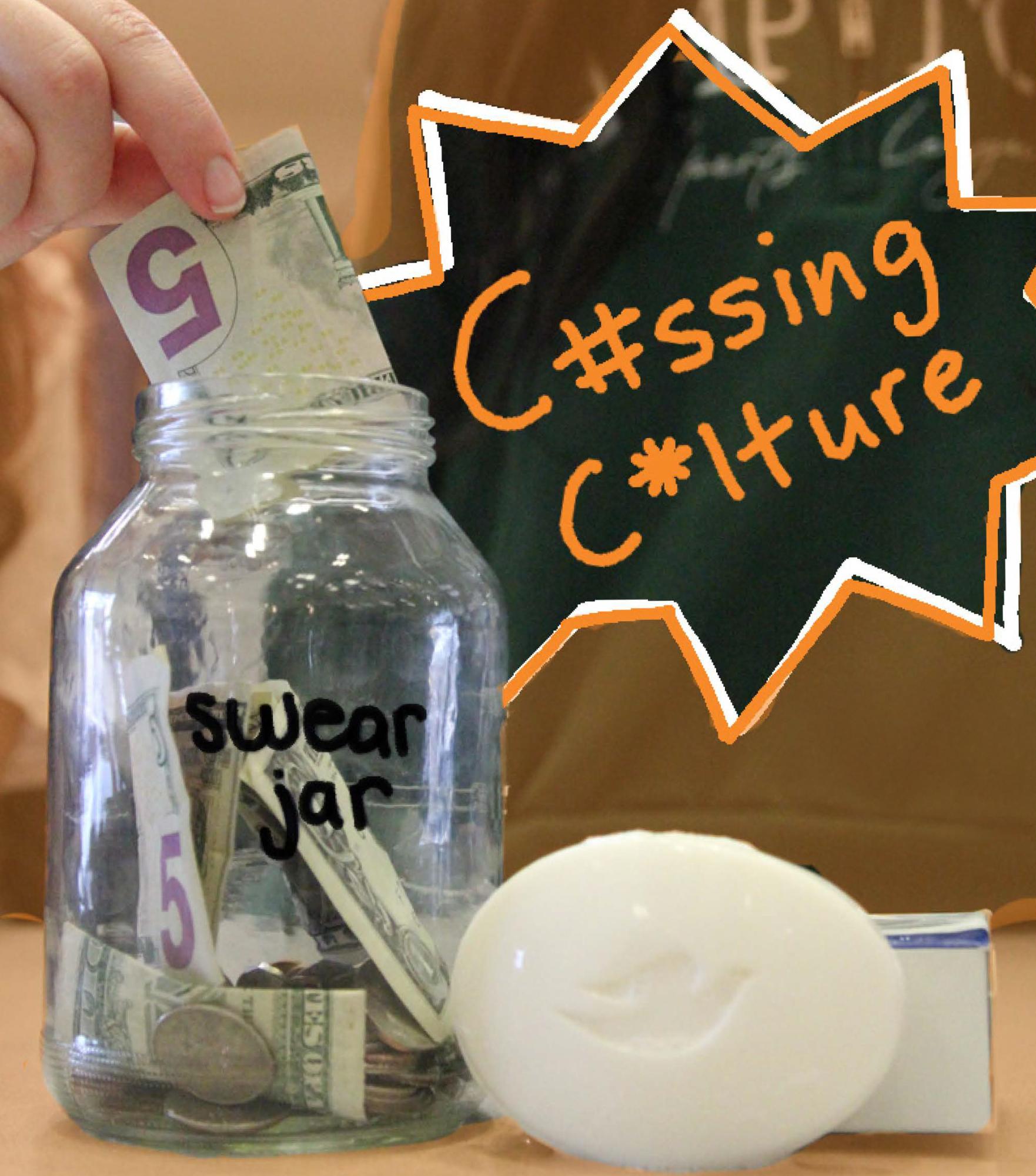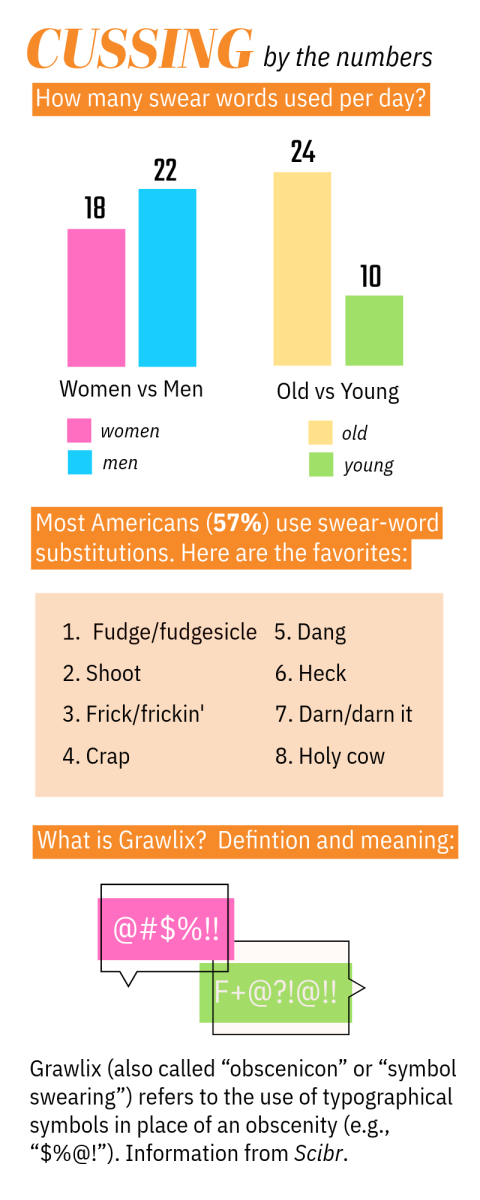Kevin Sharitz, engineering department chair, said the amount of cussing heard in the hallways has gotten out of control.
“It’s to the point that when I have my classroom door open, I can hear kids cursing heavily at all hours of the day. It’s embarrassing,” Sharitz said.

The use of profane language is a growing trend in the U.S. and around the world, becoming more socially acceptable in a variety of environments. Gen Z leads this trend, swearing more than any other generation and nearly three times as often as Baby Boomers each day, according to a study by Preply.
The lack of discipline for students who break the rule is another issue, Sharitz said.
“It’s hard to walk around as a teacher and feel like we have rules, are respected, and are in control when there are so many kids blatantly breaking a very obvious and basic rule,” Sharitz said.
Ultimately, Sharitz said, the administration does what they can to punish the behavior. The issue arises when some students who break the rules don’t care about the consequences they get and don’t change their behavior afterward.
“I feel like teachers have gotten to the point where they don’t feel like enforcing a cursing rule will even do anything, so they don’t try,” Sharitz said.

Policies and Enforcement
Freshman Principal Amy Sturges said the administration follows district policies when dealing with language because the district handbook has everything already laid out.
“If we overhear someone in the hallway talking with a friend, we usually say ‘hey, knock it off.’ Now if they turn around and start cussing at a staff member or it’s meant in a derogatory way, that’s a totally different level,” Sturges said. “Depending on the level will determine discipline.”
Sturges said some language that is especially derogatory, including slurs and sexist, racist or homophobic language, may result in elevated discipline.
Enforcement is also affected by the environment, Sturges said. In a classroom setting, students should be focused on learning, so cussing is especially not tolerated. Students treat the halls as a place to be social, Sturges said, so it is more difficult to enforce strict language regulation there.
Administrators are constantly collaborating on what discipline has been given in the past for different situations to ensure consistency, Sturges said.
“We’re in an educational center; we’re not running a pirate ship here,” Sturges said. “If you wouldn’t say it to someone who’s elderly, or someone you don’t know, or at a job site, you shouldn’t be saying it here because this is an institute to learn.”
Mike Hiestand, senior legal counsel at the Student Press Law Center, said free speech becomes less of a guarantee when it is vulgar language in a school setting.
The Supreme Court case Tinker v. Des Moines (1969) determined that First Amendment rights do extend to students in school; however, the court’s ruling in Bethel v. Fraser (1986) limited the scope of the previous case, allowing schools to regulate vulgar speech on the grounds that it could disrupt school environments.
Hiestand said the situation in Bethel v. Fraser was that a student gave a speech filled with sexual innuendo and suggestive humor at a school-sponsored event.
“The court said in that setting, where it’s a school-sponsored setting, a captive audience, they said that using indecent, inappropriate, profane language, etc. is inappropriate and school officials could stop that,” Hiestand said. “I think certainly that standard would apply in a classroom setting, in any other sort of school-sponsored activity.”
Hiestand said the standard is still highly unclear because the court’s ruling in Bethel used many terms like “inappropriate” and “profane” but did not define them in detail.
Private conversations between students at school have more free speech protections than what many school officials think, Hiestand said. Even so, many schools today, including MHS, have policies that crack down on vulgar language in these situations, but they have not yet been significantly tested in court.
“I think that’s the bottom line: If you are engaged in speech that is disruptive, school officials could probably interfere with that, but beyond that, if it’s merely profane or merely using some raw language talking amongst friends, that case hasn’t come up yet,” Hiestand said.
Cussing in School

Michael Stewart, physical education teacher, said that in a more physical and competitive environment such as a PE class, cussing can be more common than in a normal classroom.
“With 50 kids in a gym being competitive, it’s going to create more opportunities for heated conversations,” Stewart said.
Punishment for cussing doesn’t always need to come in the form of a write up, Stewart said. Instead, having a conversation with the student cussing will almost always lead to them fixing their behavior.
Additionally, Stewart said he has noticed an increase in students cussing over the nine years that he has worked at MHS.
“I feel like a lot of times now, because of social media and everything, it’s become more normalized in a lot of ways and that’s not necessarily the right path to be taking on this,” Stewart said.
Jack Knese, senior, said he typically cusses more at school because the environment is often more lenient.
“Everyone else around me does it,” Knese said. “It’s another way to express yourself and express your feelings.”
Knese said it can be awkward when people overuse cussing, but in moderation, it can add emphasis to words and emotions.
At school, students should have enough freedom to figure out what is appropriate, Knese said.
“I think it should be everyone’s individual choice,” Knese said. “It’s something that people need to learn to manage on their own and when it’s appropriate and not appropriate.”
Knese said he never chooses to cuss in classroom and professional settings, but he is likely to when spending time with friends.
Cassidy Kerber, sophomore, said she only cusses if she feels there is a clear reason to.
“I really don’t like it when people throw it in sentences just to add effect,” Kerber said. “If there’s a reason, like you stub your toe really hard, I feel like that’s reasoned.”
Kerber said she hasn’t seen cussing as a huge issue at MHS, as students almost always speak appropriately in classrooms.
“Once it starts to get offensive, like cussing at someone, that’s where the policy needs to be drawn,” Kerber said.
Outside of School
When it comes to cussing, Aiden Strobel, senior, believes it is morally wrong.
While he considers some words to have more impact than others, Strobel said he avoids all words generally viewed as derogatory or offensive.
“I’m a Christian, so I think generally it’s wrong, but leaving religion out of it, I feel like cussing is just very unprofessional,” Strobel said. “If we cuss here and we think it’s okay and don’t get in trouble, and then we go out in the workforce and start cussing, that’s not going to be tolerated.”
Strobel said he understands why students might cuss at home or with their friend group, but he doesn’t think it should ever happen in educational or professional settings.
Isabella Tyulyayev, junior, has family across Eastern Europe and visits frequently. Tyulyayev said many Eastern Europeans use lots of profanity and harsh, vulgar language.
Tyulyayev said she believes cussing is acceptable in non-serious environments.
“When you are with an authority figure, you shouldn’t be using profane language around them,” Tyulyayev said, “but when with friends or even family, it’s often okay.”
Linguistic Perspective
Dr. Andre Zampaulo, department chair of the St. Louis University department of Languages, Literatures and Cultures, said curse words are not too different from any other word in our languages.
“They acquire contextual meaning through time because of how they are used in society,” Dr. Zampaulo said. “What is a curse word and what is not changes over time.”
Dr. Zampaulo said if a student were to use the same curse words that they use with their friends in front of their parents, a negative response is likely.
“If you’re at a school board meeting, or a parent-teacher conference, and you start cussing, it is highly likely that you won’t get your point across because using curse words in that context would be undermining whatever point you want to make,” Dr. Zampaulo said.
McKenna Peters, AP Psychology teacher, said cussing in the U.S. has become more socially acceptable because it’s been normalized.
“In the past, cussing in our culture has been exclamations, big bursts of energy, and now it just seems to be like normal language dynamics for expressing an opinion,” Peters said.
Peters said the cussing culture differs around the world. In Australia, aggressive cussing in everyday speech is common, while in many Eastern Asian countries, cussing is highly taboo.
Most of how humans act in different situations is determined by what society considers “normal,” Peters said. If a person surrounds themself with people who cuss often, they would consider frequent cussing and the use of certain words as normal.
There are positive aspects of profanity related to pain management and the release of negative emotions, but Peters said this is specifically associated with the release of energy, catharsis, associated with using profanity as exclamations.
“Like if you stub your toe and let out an expletive, that’s displacing your energy because you can’t do anything to the table,” Peters said. “But the best way to deal with those frustrations is to actually address them since cussing at a person who just hurt you isn’t the best way, even though it might feel better in the short term.”






